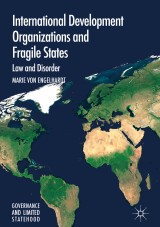Details

International Development Organizations and Fragile States
Law and DisorderGovernance and Limited Statehood
|
117,69 € |
|
| Verlag: | Palgrave Macmillan |
| Format: | |
| Veröffentl.: | 14.12.2017 |
| ISBN/EAN: | 9783319626956 |
| Sprache: | englisch |
Dieses eBook enthält ein Wasserzeichen.
Beschreibungen
<p>This book addresses a conundrum for the international development community: The law of development cooperation poses major constraints on delivering aid where it is needed most. The existence of a state with an effective government is a basic condition for the transfer of aid, making development cooperation with ‘fragile’ nations particularly challenging. The author explores how international organizations like the World Bank have responded by adopting formal and informal rules to engage specifically with countries with weak or no governments. Von Engelhardt provides a critical analysis of the discourse on fragile states and how it has shaped the policy decision-making of international organizations. By demonstrating how perceptions of fragility can have significant consequences both in practice and in law, the work challenges conventional research that dismisses state fragility as a phenomenon beyond law. It also argues that the legal parameters for effective global policy play acrucial role, and offers a fresh approach to a topic that is central to international security and development.<b></b></p><p><br/></p>
<p>Chapter 1. Introduction: Fragile states as a phenomenon beyond law.- Chapter 2. Fragile States – The Discrepancy between Empirical and Juridical Statehood.- Chapter 3. Development Cooperation with Fragile States – From Discourse to Action.- Chapter 4. The Law of Development Cooperation – Interlude on the Nature of Rules and Substance of Analysis.- Chapter 5. The World Bank’s Rules for Engaging with Fragile States.- Chapter 6. A Comparison with the African Development Bank, the Asian Development Bank, and the European Union.- Chapter 7. Formalizing Fragile States? Of Emerging Patterns and the Potentials and Perils of Regulation.- Chapter 8. Conclusion: Beyond the field of development cooperation.</p>
<div><p><b>Marie von Engelhardt</b> has worked as a researcher at the Max Planck Institute for Comparative Public Law and International Law in Heidelberg, Germany. Previously, she was a consultant for the United Nations High Commissioner for Refugees (UNHCR) in Geneva, Switzerland, and for the World Bank in Nairobi, Kenya, and Washington, USA. </p><p><br/></p></div><div><br/></div>
<p>This book addresses a conundrum for the international development community: The law of development cooperation poses major constraints on delivering aid where it is needed most. The existence of a state with an effective government is a basic condition for the transfer of aid, making development cooperation with ‘fragile’ nations particularly challenging. The author explores how international organizations like the World Bank have responded by adopting formal and informal rules to engage specifically with countries with weak or no governments. Von Engelhardt provides a critical analysis of the discourse on fragile states and how it has shaped the policy decision-making of international organizations. By demonstrating how perceptions of fragility can have significant consequences both in practice and in law, the work challenges conventional research that dismisses state fragility as a phenomenon beyond law. It is posited that the legal parameters for effective global policy play a crucial role, and a fresh approach to a topic that is central to international security and development.<b></b></p><p><br/></p>
Takes a novel approach to demonstrate the political and legal significance of the 'fragile states' idea Shifts the focus away from the controversial debate on what 'fragile states' are to the question of how they are perceived and responded to, including in legal terms Adds to the existing legal scholarship by extending the scope of analysis from rare incidents of complete state collapse to the broader spectrum of limited statehood
Diese Produkte könnten Sie auch interessieren:

Inclusión educativa de niños, niñas y adolescentes migrantes venezolanos, en Colombia

von: Douglas Jiménez

15,99 €
















